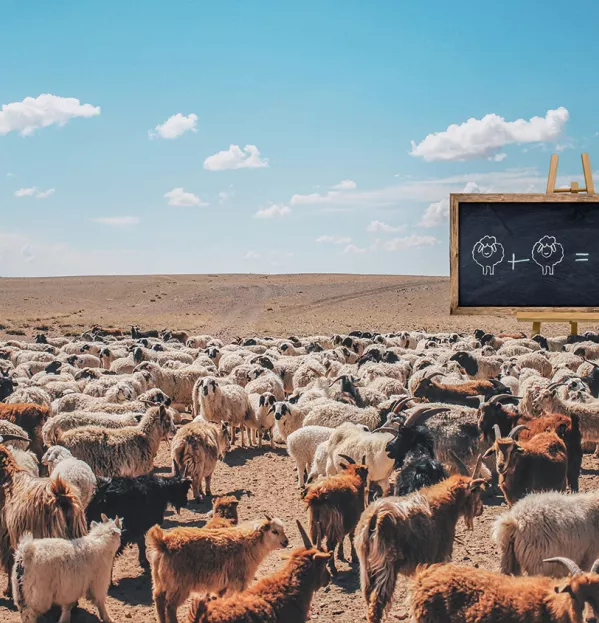Herding sheep in the desert taught me how to be a head

Training to become a headteacher, I took a slightly different route to most: I went into the Sahara Desert and took charge of herding 164 stubborn sheep through the deadly sand dunes. It was one of the best decisions I have ever made.
For the world around us is changing and changing fast. The requirements on teachers and on pupils, both during their schooling and when they enter the world of work, look very different compared with a generation ago. Yet education is not keeping pace - we continue to teach and learn in the same old ways: inside a classroom and theory-based. I wanted to challenge this conventional approach.
So I went into the desert. And when I became the principal of a school of 2,000 pupils and managed a staff of 150 teachers, it was my desert experience that I drew from in order to lead the school - not books on management theory or complex texts around educational leadership.
Here are the main things that herding sheep through sand storms taught me about leading a school.
1. Empathy
In my very first minute with the flock, I tried asserting my authority out loud: “Hello, I am your leader.”
They turned their backs to me.
Each day, I offered the flock food and water, opened gates to let them pass through, cleaned up their leftovers.
Slowly, they allowed me to get close to them. I realised it was only when I served them repeatedly that they began to accept me. I needed to bring value to them and meet their needs in order for them to begin to look to me as their leader.
When I first became a principal, I put this lesson to good use. In my very first meeting with the school’s teachers, one of them challenged me.
As a highly experienced teacher, he wanted to know how, as a young man starting my career, I was qualified to run the school. I realised that he wasn’t asking me to share my CV with him. What he wanted was to feel that I would bring value to the school - he needed to believe that I would be an asset to the school in order to accept me as his leader.
I reassured him of how I intended to do just this. That I would carry his water and open the gates. And I proved this to all the teachers in how I conducted myself in those first months.
It had a major impact on the success of implementing my vision.
2. Trust and respect
In the desert, I needed the sheep to follow me, willingly and confidently, so I could lead them to food and water - otherwise they would die.
It was only with time and continuous commitment that they started to trust me.
Trust is essential in leadership. Without gaining it, it is only a matter of time until the relationship collapses.
Do we trust the leader who assumes that he or she alone has the solution for everything, who treats teachers like machines or who thinks only of budgets? Of course not. We trust the leader who trusts us and treats us with respect.
Unless you are a world-renowned leader, trust doesn’t come from an impressive resume. It comes from hard work and putting people first.
3. Resilience
My time in the desert showed me how important it is to learn from practice, from mistakes, from failure. I made endless mistakes, not least getting lost in the desert - a mistake which could easily have cost myself and the herd our lives. But it was from making mistakes that I learned the greatest lessons.
Too often, the focus in education is on higher grades, but we should be calling for more failures and mistakes. If students are regularly receiving top grades in an exam, it’s a sign that they need a greater challenge. It teaches them that they no longer need to improve, they can sit back and take it easy until next year.
And as a leader, we need to be unafraid to fail and we need to ride the rough times with the same confidence and commitment that we boast in the good times.
The desert ensured I could do that. Because in the desert, you don’t get to choose the way you live, you live the way it is.
4. Freedom and flexibility
It contradicts the purpose of learning when we expect everyone to learn the same thing, at the same speed and in the same way. People are not machines. Just like me when I was herding my sheep, the best teachers will learn to adapt to each student’s pace and continue challenging them. And the best leaders will recognise where their staff are struggling, when they need praise, when they need to rest.
I learned more in one week in the desert than in an entire year in business school. I faced hardship and loneliness, and failed on more than one occasion - but I gained so much knowledge and wisdom, all from a stubborn herd of 164 sheep.
AlBaraa H Taibah is a former school leader and co-founder of the Evidence for Education Consultancy. The Modern Shepherd: leadership secrets and life wisdom that I learned while shepherding is out now, priced £4.99
You need a Tes subscription to read this article
Subscribe now to read this article and get other subscriber-only content:
- Unlimited access to all Tes magazine content
- Exclusive subscriber-only stories
- Award-winning email newsletters
Already a subscriber? Log in
You need a subscription to read this article
Subscribe now to read this article and get other subscriber-only content, including:
- Unlimited access to all Tes magazine content
- Exclusive subscriber-only stories
- Award-winning email newsletters